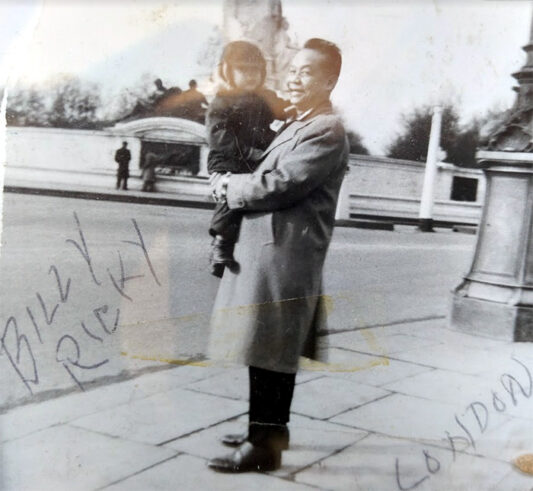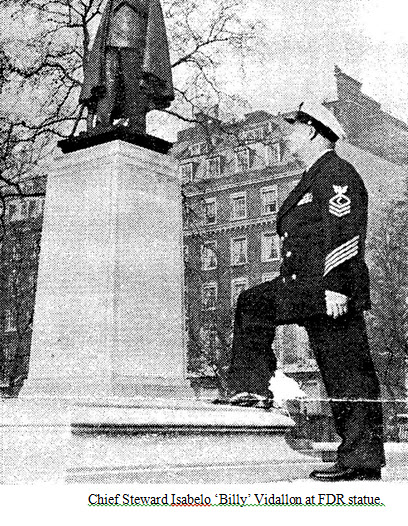A Navy Chief Remembers
By MARTY GERSHEN, Staff Writer Stars and Stripes
ONE OF THE first things Chief Steward Isabelo Vidallon did after reporting for duty with headquarters of the commander-in-chief, U.S. Naval Forces, Eastern Atlantic, and the Mediterranean, in London this February was to pay homage to the statue of Franklin D. Roosevelt.
The figure stands in Grosvenor Square, less than a stone’s throw from the U.S. Navy buildings and the U.S. Embassy. An unusual statue shows the late President in a standing- position, the monument in London’s “little America” presented by the people of England as a U.K. tribute to a non-British world figure. Unveiled in 1948 by Mrs. Eleanor Roosevelt in the presence of King George VI, the stone memorial resulted from subscriptions and contributions from the British people.
Steward to FDR, Admirals, and other VIPs for his 28 years in the Navy
Vidallon, who serves as steward to Adm. James L. Holloway, is a native of Mindanao in the Philippines and calls Norfolk, Va., home. He has been a steward to admirals and other VIPs for 28 years in the Navy.
The first great man he ever served with–someone he will never forget– was Franklin Delano Roosevelt. Vidallon was a steward aboard the Presidential yacht Potomac and accompanied Roosevelt to the President’s summer home in Campobello.
The only concession to Roosevelt’s physical disability, recalls the Navy veteran, was an elevator installed aboard the Potomac to take Roosevelt to the quarter-deck.
“I’ve seen the President navigate and sail schooners, and occasionally, he’d go fishing,” recalled the sailor who saw action during World War II with the Atlantic and Pacific fleets.
A man whose admiration for Roosevelt seems to be surpassed only by his devotion to the Navy, Vidallon explained his feeling: “I’m not a Democrat, but you don’t have to be a politician to love Roosevelt.”
He never talked down to any of us who served aboard the Potomac, all hands were equal, including the President.
Vidallon recalls the Roosevelt children fondly, easily referring to them as Jim, Junior, John, and Anna. “Eisenhower, Teddy Roosevelt, George Washington, they were all Army Presidents,” Vidallon explained, “but FDR was a Navy President.”
Recalling the depression days of the ’30s when he enlisted in the Navy after completing Piang High School in his home of Cotabato City, ‘the Philippines, Vidallon said, “We were paid $21 a month in those days. Then they cut our pay to $17 because of the bad times. But when things looked up again, we got the difference paid back to us.”
The enlistment of Philippine nationals into the U.S. Navy has become almost a tradition, said Vidallon. Even today, with the Philippine Islands a sovereign nation, a special agreement between the two countries permits the enlistment of Philippine men into the U.S. Navy.
“Today, a Filipino may hold any rate for which he qualifies in the U.S. Navy,” said Vidallon. He proudly pointed out that a- former shipmate of his, a steward of many years who also was a student of electronics, today is an electronics mate 1/C after passing the Navy examinations for that highly technical field with flying colors.
My father was beloved by his family and the men he served with. Moreover, I gladly pass on his love, passion, and determination to my family.
Remembering you, Dad!
Your son Rick Vidallon




